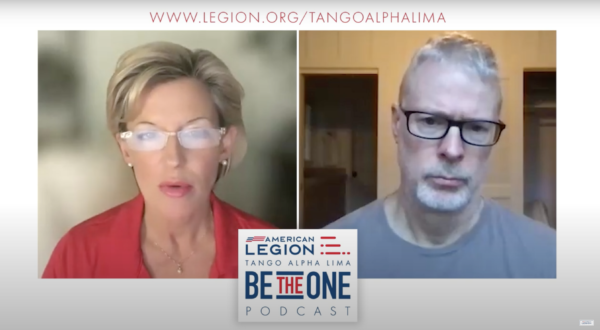
Dr. Frueh’s discusses his book, “Operator Syndrome” on episode 11 of The American Legion’s podcast, Tango Alpha Lima (Photo: American Legion HQ)
In episode 11 of the “Be the One” series from The American Legion podcast Tango Alpha Lima, Christopher Frueh, PhD, discusses his approach to PTSD treatment. His recently published book, “Operator Syndrome,” offers a different perspective on treating PTSD.
Clinical psychologist Dr. Frueh explains that his approach is different from traditional mental health frameworks that have been in use for decades. According to Dr. Frueh, while there is significant focus on Veterans who have suffered concussions from explosions, other forms of brain exposure are frequently ignored.
“We need to recognize traumatic brain injury as the signature injury of modern warfare, something we’ve often overlooked,” he stated.
Dr. Frueh cites examples such as blast exposures during training exercises, which cause injuries different from those resulting from direct impact, such as traumatic brain injuries. Invisible blast waves permeate the body, damaging soft tissues in ways that are not immediately apparent.
With over three decades of experience, Dr. Frueh has worked with groups including Veterans, Service Members, special operators, private defense contractors, and firefighters. His contributions to the field include clinical trials, epidemiological studies, historical research, and neuroscience investigations, resulting in over 300 scientific publications.
Dr. Frueh’s journey began at the Department of Veterans Affairs’ PTSD clinic, but his path has evolved since then, encompassing extensive research and clinical practice. Dr. Frueh’s career and personal experiences were influenced by his father, an Air Force physician who served in Vietnam. Driven by this awareness, he pursued a career in psychology with a specific interest in working with Veterans.
“I grew up with an awareness of the burdens our soldiers carry both during and after their service,” said Dr. Frueh, professor of psychology at the University of Hawaii-Hilo.
In 2020, Dr. Frueh published a paper on the “Operator syndrome” framework, which is particularly prevalent in the Special Operations community. This framework received positive feedback from Veterans, though it was met with skepticism within the scientific community. Many Veterans across branches felt “heard.”
In the podcast, Tango Alpha Lima, Dr. Frueh states there is an overemphasis on the psychological and an underemphasis on the physiological. He talks about the need to bring physiological considerations in PTSD treatment to the foreground. He points out that many Veterans in their 30s, despite appearing fit, suffer from problems like insomnia, sleep disturbances, and low testosterone levels. His solution is to prioritize addressing these physiological aspects, which can alleviate chronic pain, anxiety, and other symptoms of PTSD. Treatments such as stellate ganglion block therapy and ketamine therapy, which have shown promise, are not widely available through the VA.
Foundations for Veterans like The American Legion play an important role in driving change. Addressing the root causes of conditions like PTSD is essential in the fight against Veteran suicide and the lingering trauma within their families. By shifting focus to include physiological treatments, as proposed by Frueh, there is hope for more care that will significantly improve Veterans’ quality of life.
To hear more about Dr. Frueh’s insights and explore over 250 other episodes, visit legion.org/tangoalphalima.












